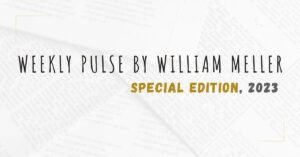The Weekly Pulse is my content curation and my highlights from readings, books, podcasts, insights, and everything I discovered during the week.
So, let’s go with some discoveries from the week!
#1 – The Right Way to Manage Expats
#2 – The Myth of Multitasking: Why Fewer Priorities Leads to Better Work
#3 – Managing in the Knowledge Economy
#4 – 3 Common Fallacies About Creativity
#5 – The One Thing You Need to Know About Managing Functions
The Right Way to Manage Expats
Source: Harvard Business Review
Author: J. Stewart Black and Hal B. Gregersen
Summary: In today’s global economy, having a workforce that is fluent in the ways of the world isn’t a luxury. It’s a competitive necessity. No wonder, nearly 80% of midsized and large companies currently send professionals abroad—and 45% plan to increase the number they have on an assignment.
3 Highlights:
“… In the global economy, having a workforce that is fluent in the ways of the world is a competitive necessity. That’s why more and more companies are sending more and more professionals abroad. But international assignments don’t come cheap: On average, expatriates cost a company two to three times what they would cost in equivalent positions back home…“
“… As a result, they are poised to capture tomorrow’s global market opportunities by making their investments in international assignments successful today…“
“… Companies that follow these practices share a conviction that sustained growth rests on the shoulders of individuals with international experience…”
Access the full reading of this Weekly Pulse item here >>
The Myth of Multitasking: Why Fewer Priorities Leads to Better Work
Source: James Clear Site
Author: James Clear
Summary: Yes, we are capable of doing two things at the same time. It is possible, for example, to watch TV while cooking dinner or to answer an email while talking on the phone. What is impossible, however, is concentrating on two tasks at once. Multitasking forces your brain to switch back and forth very quickly from one task to another
“… Doing more things does not drive faster or better results. Doing better things drives better results. Even more accurately, doing one thing as best you can drive better results…“
“… And the more I study people who are able to do that, people who are masters of their craft, the more I notice that they have one thing in common. The people who do the most valuable work have a remarkable willingness to say no to distractions and focus on one thing…”
Access the full reading of this Weekly Pulse item here >>
Managing in the Knowledge Economy
Source: Harvard Business School
Author: W. Chan Kim and Renée Mauborgne
Summary: When employees don’t trust managers to make good decisions or to behave with integrity, their motivation is seriously compromised. Their distrust and its attendant lack of engagement is a huge, unrecognized problem in most organizations. This issue has always mattered, but it matters now more than ever because knowledge-based organizations are totally dependent on the commitment and ideas of their employees. Unfortunately, neither integrity nor good judgment can be magically conferred on all the managers in an organization.
“… The fair process reaches into a dimension of human psychology that hasn’t been fully explored in conventional management practice. Yet every company can tap into the voluntary cooperation of its people by building trust through fair processes…“
“… Fair process responds to a basic human need. All of us, whatever our role in a company, want to be valued as human beings and not as “personnel” or “human assets.” We want others to respect our intelligence. We want our ideas to be taken seriously. And we want to understand the rationale behind specific decisions. People are sensitive to the signals conveyed through a company’s decision-making processes. Such processes can reveal a company’s willingness to trust people and seek their ideas—or they can signal the opposite...”
Access the full reading of this Weekly Pulse item here >>
3 Common Fallacies About Creativity
Source: Harvard Business Review
Author: Pronita Mehrotra, Anu Arora, and Sandeep Krishnamurthy
Summary: Why do organizations have so much trouble enabling employee creativity? The answer lies in subtle and deeply ingrained behaviors that prevent companies from creating a creative culture. The authors identify three misconceptions that managers must overcome to effectively build creative cultures.
“… To promote more creative ideas, leaders should utilize simple tools to capture individual ideas before they are opened to the whole group…“
“… Business leaders agree that creativity and innovation contribute fundamentally to competitive advantage. Companies with an innovation-focused culture are three times more profitable. Leaders who seek to initiate a new creativity practice must consciously avoid the three illusions…“
“… When you ask people to describe an ideal brainstorming session the most common elements you hear are: people getting together, an energetic and exciting mood, and lots of ideas flying across the room…”
The One Thing You Need to Know About Managing Functions
Source: Harvard Business Review
Author: Roger L. Martin and Jennifer Riel
Summary: There’s a secret about the strategy that no one tells you: Every function has one, whether or not it is written down and whether or not it is the product of an official strategic-planning process. If functions do not adopt a strategy consciously, they almost inevitably end up defaulting to one of two unconscious models, both of which are likely to result in their becoming a drag on corporate performance rather than a driver of it. In this article, the authors describe the problems of unconscious strategies and outline a strategy-making framework to help functions strengthen the capabilities that set their company apart.
“… Corporate functions typically do not formulate a strategy tailored to the needs of the business. As a result, they end up spreading themselves too thin or overinvesting in best-in-class operations regardless of whether they support their companies’ overall strategy…“
“… Leaders should engage in a strategy-making process that starts by asking, What is the implicit current strategy of the function, as reflected in the choices that it makes every day? And then asks, What are the strategic priorities of the rest of the corporation, and is the function critical to them?…“
“… Functions must make clear, focused, and explicit choices aimed at strengthening the capabilities that set their company apart in the marketplace…”
Access the full reading of this Weekly Pulse item here >>
Do you want to get new content in your Email?
I am incredibly grateful that you have taken the time to read this Weekly Pulse.
The Weekly Pulse is an important section of this website, aiming to share good stuff with you every week!
Do you want to explore more? Check more Weekly Pulse content here.
Check my main categories of content below:
- Agile
- Blog
- Book Notes
- Career
- Leadership
- Management
- Managing Yourself
- Productivity
- Project Management
- Technology
- Weekly Pulse
Navigate between the many topics covered in this website:
Agile Art Artificial Intelligence Blockchain Books Business Business Tales Career Coaching Communication Creativity Culture Cybersecurity Design DevOps Economy Emotional Intelligence Feedback Flow Focus Gaming Goals GPT Habits Health History Innovation Kanban Leadership Lean Life Managament Management Mentorship Metaverse Metrics Mindset Minimalism Motivation Negotiation Networking Neuroscience NFT Ownership Parenting Planning PMBOK PMI Politics Productivity Products Project Management Projects Pulse Readings Routines Scrum Self-Improvement Self-Management Sleep Startups Strategy Team Building Technology Time Management Volunteering Work
Do you want to check previous Weekly Pulse posts? Check the last couple of weeks:
- Weekly Pulse by William Meller | Special Edition, 2023
- Weekly Pulse by William Meller | Week 51, 2023
- Weekly Pulse by William Meller | Week 50, 2023
- Weekly Pulse by William Meller | Week 49, 2023
- Weekly Pulse by William Meller | Week 48, 2023
Support my work by sharing my content with your network using the sharing buttons below.
Want to show your support tangibly? A virtual coffee is a small but nice way to show your appreciation and give me the extra energy to keep crafting valuable content! Pay me a coffee:





